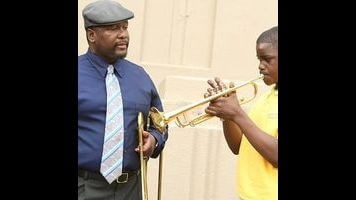Treme: "All on Mardi Gras Day"

It would have been an obvious choice for Treme to close its first season on Mardi Gras Day, but here we are, two episodes away from the finish, and the first Fat Tuesday since Katrina passes with the same ambivalent tone that’s carried the show from the beginning. Celebrating Mardi Gras is important for continuity and tradition, for lifting people’s spirits, and perhaps for just giving them an excuse to get completely sloshed. (Whether people feel despair or jubilation on Mardi Gras, drinking heavily is the common denominator. As Homer Simpson once toasted: “To alcohol: The cause of, and solution to, all of life’s problems.”) But “the ruins of the Crescent City” are still going to be there the next morning and some people aren’t around anymore—the dead, the displaced, the fed-up. It’s bound not to be the same and locals are keenly aware of the difference.
“All on Mardi Gras Day” approaches the big event the expected Simon way, filling out the larger picture through the pointillism of smaller character sketches. If I have a complaint, it’s that Treme’s Mardi Gras is almost too emotionally muted; it’s not unreasonable to expect that the Mardi Gras episode would be in some way momentous or at least have a special flavor to it. But there are pleasures and insights in going the low-key route, too, and while this hour lacked the (relative) explosiveness of last week’s revelations about Daymo, it was a subtle barometer of where all the characters’ heads are at as we head into the home stretch.
Who else worried that Toni would find her husband dead on the front porch the morning after? Creighton’s mounting despair throughout the episode seemed to follow a suicidal arc, from the scene with his daughter in the beginning, where he depresses her with a tour of obliterated landmarks, to his early return home from Mardi Gras, which has changed so much for him that he can hardly bear it. Add to that his clear struggles in putting together a book—which is key to his livelihood and sense of self-worth—and he’s in a pretty deep pit of despair. He’ll likely pull himself out of it—and he’s certainly got a great wife and daughter, and the lust for life to do it—but for a character who to this point had personified a strain of New Orleans’ pissy resilience, Creigh hit the bottom hard here.
Remarkably, the character who should be hit hardest by Mardi Gras is Big Chief, who sits in jail after devoting so much time to bringing people home and sewing together headdresses for the occasion. The authorities are clearly pushing back his hearing past Mardi Gras as a punitive measure for raising a fuss over the boarded-up projects, but he’s relatively sanguine about it. Yes, there’s a sad shot of him alone on his prison bunk as the afternoon passes, but when Delmond retrieves him the next morning, he’s not unhappy to hear about his son’s good time. It’s possible that Big Chief reconciled himself to this possibility long ago, when he first hatched the project-squatting scheme.
To me, the best thing about “All on Mardi Gras Day” was that like any big party, there’s a lot of mingling going on. Sometimes it happens on a small scale: A nice moment where Ladonna and the government attorney come to an understanding over the latter’s fidelity to her job, a tense one where Ladonna’s crooked roofer attacks her for his self-inflicted misfortunes, and the oh-so-glorious return of the Japanese jazz superfan, who’s more than understanding about why Antoine gave away the spanking new trombone he bought him. (Antoine is suitably moved that his benefactor knows so much about his now-deceased friend, whose legacy seemed doomed to obscurity, even among aficionados.)
